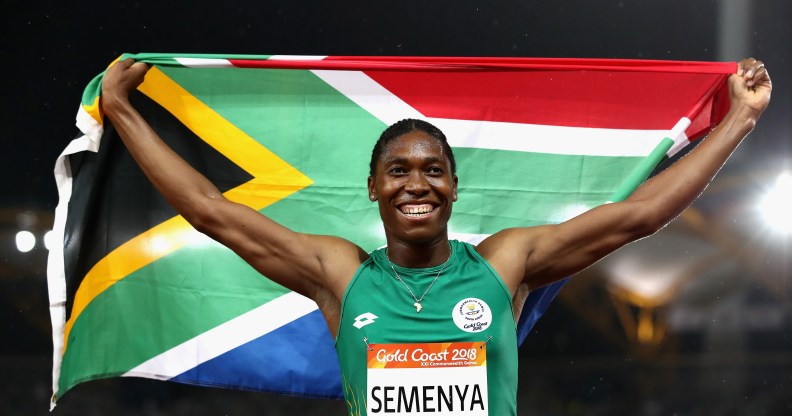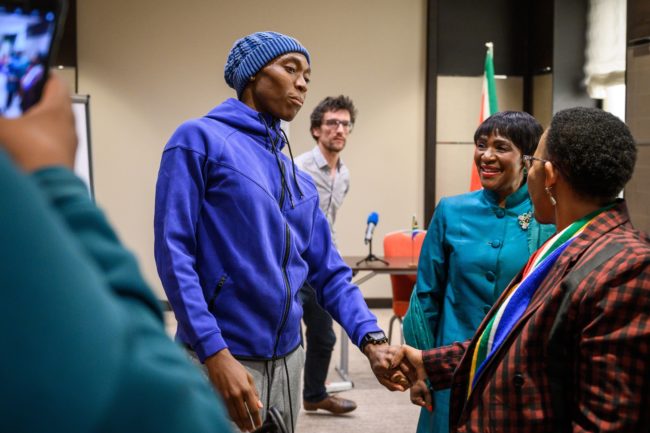UN rights council condemns IAAF testosterone rule for female athletes

Caster Semenya of South Africa, who was born with intersex characteristics, is fighting a new IAAF policy that would force her to undergo hormone therapy to compete. (Cameron Spencer/Getty)
The United Nations Human Rights Council (UNHRC) has passed a resolution condemning the imposition of medical procedures on female athletes showing high levels of testosterone.
The resolution, brought by South Africa and titled “Elimination of Discrimination against Women and Girls in Sport,” was adopted by consensus without vote on Thursday (March 21).
The resolution called on governments to ensure sports organisations “refrain from developing and enforcing policies and practices that force, coerce or otherwise pressure women and girl athletes into undergoing unnecessary, humiliating and harmful medical procedures,” wading into a controversy around new rules for female athletes presenting intersex characteristics.
Last year, the International Association of Athletics Federations (IAAF) proposed new restrictions on the testosterone levels of female athletes in running events.
“Access to sport is a litmus test for the rights of intersex people, highlighting the ways that our legal birth classifications can be disregarded.”
— Morgan Carpenter
The rules would require athletes with particularly high levels of testosterone to compete in the male category or take hormones to lower their testosterone levels.
One of the athletes directly affected by the new rules is South African runner Caster Semenya, who has naturally high levels of testosterone due to hyperandrogenism and has been the subject of intense scrutiny for the past decade, ever since she dominated the 800 metres event at the 2009 world championships in Berlin.
The 28-year-old, who is a lesbian and married to fellow runner Violet Ledile Raseboya, has mounted a court challenge against the new rules, delaying their implementation until a verdict is reached.

Olympic champion Caster Semenya (C) meets South Africa’s Sports Minister Tokozile Xasa (R) and South Africa’s ambassador to the United Nations in Geneva, Nozipho Joyce Mxakato-Diseko on February 21 in Lausanne, Switzerland. (Fabrice Coffrini/AFP/Getty)
As the Geneva-based UNHRC adopted the resolution on Thursday, the Court of Arbitration for Sport based in Lausanne delayed a decision on Semenya’s case until late April.
South Africa welcomed the UNHRC decision in a statement: “This is the first time that the human rights system holds international sport associations to account for their obligations under international human rights law. South Africa is pleased that the Human Rights Council struck a blow for Caster Semenya and athletes like her.”
The resolution also instructs the UNHRC Commissioner to prepare a report on the intersection of race and gender discrimination in sports to be presented in June 2020.
Intersex campaigners welcome ‘groundbreaking’ resolution on female athletes
Intersex campaigners welcomed the adoption of what they called the “first resolution on the rights of people born with intersex variations.”
Morgan Carpenter, co-executive director at Intersex Human Rights Australia, said in a statement: “Access to sport is a litmus test for the rights of intersex people, highlighting the ways that our legal birth classifications can be disregarded, how our bodies are sites of public scrutiny and stigmatisation, and our right to bodily integrity disregarded.”
Carpenter noted that there is no scientific basis in support on IAAF’s proposed rule.
He said: “There is no published, transparent, and reproducible evidence of a clear or unethical advantage by women athletes born with variations of sex characteristics over other women athletes.
“Exclusion from women’s competitive sport is discriminatory under such circumstances; it is not reasonable, proportionate and non-arbitrary. Sporting authorities and associations must now recognise a need for procedures to meet international human rights standards.”
Tony Briffa, newly elected Chair of the Intersex Committee at the International Lesbian, Gay, Bisexual, Trans and Intersex Association (ILGA), added: “We recognise the tremendous work from South Africa has in presenting this groundbreaking resolution and also acknowledge the importance on bringing this topic to the Council for the first time.”

